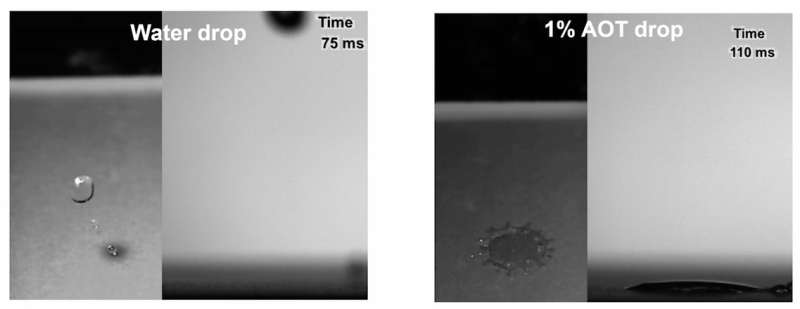March 2, 2017 report
A certain type of salt added to pesticide found to help prevent waste due to splashing

(Phys.org)—A team of researchers affiliated with several institutions in China has found that adding a certain type of salt to liquid pesticides greatly reduces waste due to splashing. In their paper published in the journal Science Advances, the team describes their research and the properties of the salt that help prevent splashing.
When farmers spray pesticides onto crops, the researchers note, almost half of the liquid bounces off the plant leaves and winds up on the ground as waste—such splashing also causes uneven leaf coverage, as well. A lot of research has gone into finding additives for fertilizers that both reduce splashing and are not harmful to the humans that will eventually eat the crops, but until now, the search has been futile. In this new effort, the researchers in China report that they believe they have at long last found the right substance—a type of salt called dioctyl sodium sulfosuccinate. In the commercial world, it is known as Aerosol OT, and is already used in a variety of products including pharmaceuticals and printer ink.
Adding a small amount (one part per hundred) of Aerosol OT to liquid fertilizer, the research team found, caused the liquid to adhere to leaves rather than bounce or splash off of them. Filming the action and replaying it in slow motion revealed that the salt caused the liquid to spread out and adhere to a leaf rather than rebound. This, they noted, was because it caused a change in the wetting ability of the liquid, which is a measure of the degree to which a liquid maintains contact with a solid surface. The researchers also note that Aerosol OT can be easily washed from crops by simply rinsing them with plain water. Also, because of its use in pharmaceutics it has been proven to be safe for human consumption.
There is still more work to do, the team notes, before pesticide makers can start adding the salt to their products—tests must be run on a wide variety of plant types and with leaves at various stages of development. If things work out, farmers could significantly reduce the amount of pesticide they must spray on their crops, reducing both runoff and costs.
More information: Meirong Song et al. Controlling liquid splash on superhydrophobic surfaces by a vesicle surfactant, Science Advances (2017). DOI: 10.1126/sciadv.1602188
Abstract
Deposition of liquid droplets on solid surfaces is of great importance to many fundamental scientific principles and technological applications, such as spraying, coating, and printing. For example, during the process of pesticide spraying, more than 50% of agrochemicals are lost because of the undesired bouncing and splashing behaviors on hydrophobic or superhydrophobic leaves. We show that this kind of splashing on superhydrophobic surfaces can be greatly inhibited by adding a small amount of a vesicular surfactant, Aerosol OT. Rather than reducing splashing by increasing the viscosity via polymer additives, the vesicular surfactant confines the motion of liquid with the help of wettability transition and thus inhibits the splash. Significantly, the vesicular surfactant exhibits a distinguished ability to alter the surface wettability during the first inertial spreading stage of ~2 ms because of its dense aggregates at the air/water interface. A comprehensive model proposed by this idea could help in understanding the complex interfacial interactions at the solid/liquid/air interface.
Journal information: Science Advances
© 2017 Phys.org


















